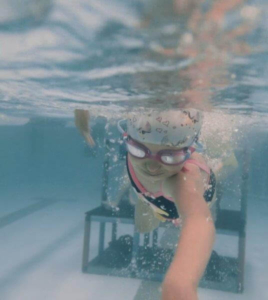As winter sets in and temperatures drop, many families begin to look into winter sports and may be tempted to hang up their swimsuits and retire their goggles until warmer weather returns. However, while swimming during the winter months might seem counterintuitive, it holds numerous benefits, especially for children. In this article, we’ll explore why it’s important for children to keep swimming during winter and how it can positively impact their physical and mental well-being.
- Safety Precautions: Encouraging children to swim during winter reinforces important water safety habits. Regularly practising swimming skills and water safety techniques makes children more proficient at navigating different aquatic environments and responding effectively to emergencies. These skills are invaluable, as drowning remains a leading cause of accidental death among children worldwide.
- Skill Development: Winter swimming allows children to continue honing their swimming skills and techniques. Consistent practice helps them refine their strokes, build endurance, and increase confidence in the water. Moreover, swimming during winter can be a valuable learning experience, as children may encounter different water conditions and learn how to adapt to them safely.
- Boosting Immunity: Contrary to popular belief, swimming during winter can help strengthen the immune system. Exposing the body to water stimulates circulation and boosts the production of white blood cells, which play a crucial role in fighting infections. Additionally, regular physical activity, such as swimming, has been linked to a reduced risk of respiratory infections and other common illnesses.
- Mental Well-being: Swimming is beneficial for physical health and mental well-being. Its rhythmic nature, combined with water’s soothing properties, can help reduce stress, anxiety, and symptoms of depression in children. Swimming also promotes relaxation and improves sleep quality, which is essential for maintaining overall mental wellness, especially during the darker and colder months of winter.
- Physical Exercise: One of the most obvious reasons for children to continue swimming during the winter is the physical exercise it provides. Swimming is a full-body workout that engages various muscle groups, improves cardiovascular health, and enhances flexibility and endurance. By maintaining their swimming routine during the colder months, children can stay active and counteract the temptation to spend more time indoors sedentary.
- Social Interaction: Swimming is often a social activity that allows children to interact with their peers, instructors, and other members of the swimming community. Continuing to swim during winter enables children to maintain these social connections and friendships, fostering a sense of belonging and camaraderie. Moreover, group swimming sessions can provide a supportive environment for children to challenge themselves, set goals, and celebrate achievements together.
While the idea of swimming during winter may seem daunting, significantly, when the temperatures drop, the benefits far outweigh the challenges. Keeping your child’s skills current and avoiding regression, your child will become more confident and potentially independent in the water before summer starts. Winter swimming offers many advantages for children, from physical exercise and immune-boosting to mental well-being and skill development. Parents and caregivers can help children stay healthy, happy, and safe both in and out of the water by encouraging them to keep swimming during the colder months. So, let’s keep the tradition afloat and dive into the wonders of winter swimming!












